The motto “If you can’t beat them, join them” best encapsulates the state of artificial intelligence in marketing today. Businesses can’t ignore technology anymore, and this article examines how businesses are leveraging AI for marketing.
While AI still has teething problems, what it can already do is immense. Smart marketing is a key area in which businesses stand to benefit the most by using different AI tools.
Marketers can significantly cut marketing budgets by tapping into AI for marketing. If you’re a business owner or marketer thinking of switching things up a little, read this to the end.
5 Ways Businesses Are Leveraging AI for Marketing
AI-powered marketing automation tools have made it affordable and easy for businesses to sell and make money online. AI has many marketing applications that can help you get better returns on your investment.
Here are some ways businesses can leverage artificial intelligence for smart marketing.
1. AI-Driven Market Research
Market research is the process of collecting, analyzing, and interpreting data about the industry dynamics, key competitors, and other business aspects.
You don’t need to pay a fortune to conduct marketing research. AI-driven market research saves time and reduces guesswork by providing precise insights into customer behavior. This can help boost marketing metrics like impressions, engagement, and more.
An example of a market research AI tool is Pecan AI. It collects accurate data on consumer behavior and predicts their future behavior. Pecan AI can predict customer conversion, chargebacks, upsell rates, and more.
Here’s how Pecan AI tracks and predicts customer churn rates and offers suggestions to avoid it.
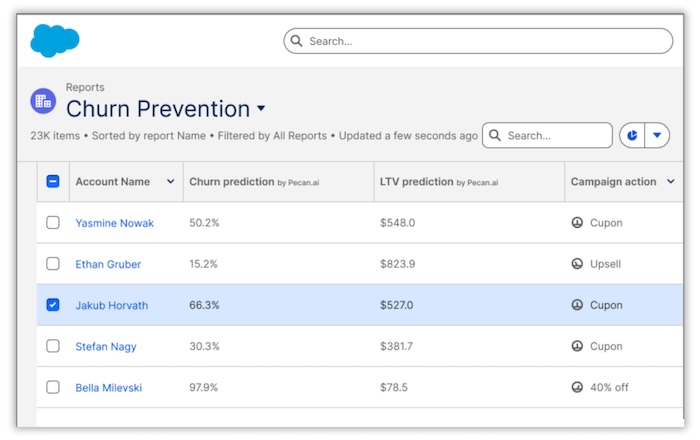
2. AI-Driven Marketing Video Production
AI is revolutionizing how businesses create marketing videos. One key benefit is speed. Traditional video production often takes time, but AI can cut this down. Tools analyze content, suggest visuals, and even generate scripts tailored to a target audience.
For example, using LTX Studio by Lightricks, creative marketers can enter a brief prompt or a full script for a video idea. The AI engine turns the concept into a complete storyboard, broken down into scenes, shots and character profiles.
You can refine these elements as much or as little as you like, and then export it all as a pitch deck for approval. You can also invite collaborators to work on projects simultaneously with you, and eventually export assets for further development in video editing apps.
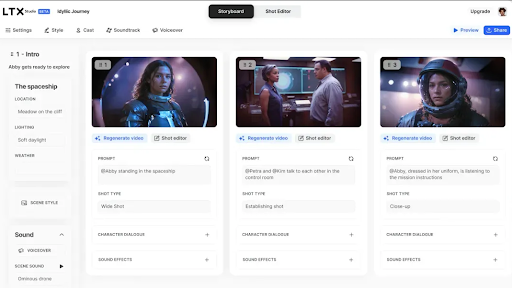
3. SEO and Social Media Content Creation
According to a 2023 survey by Ahrefs, 96.55% of web pages don’t receive any referral traffic from Google. Breaking into the remaining 3.45% requires meticulous SEO content creation, and AI can help with the quality of content. From the perspective of social media content distribution, it all hinges on having a steady flow of creative, visually compelling images and videos to fuel the newsfeed algorithms.
Either way, the challenge for business marketers is to create better content continuously, so they can drive strong engagement on their posts. It’s hard to maintain the quality continuously of strictly human-generated content, but fortunately, AI-powered content ideation and planning goes a long way towards solving this issue. While AI can’t yet generate its own ideas and prepare audience-facing content on a fully automated basis, it’s extremely useful as a collaborative copilot.
For example, ChatGPT is a powerful tool that can assist in generating social media captions. Marketers can use it to quickly draft and iterate on content to save time.
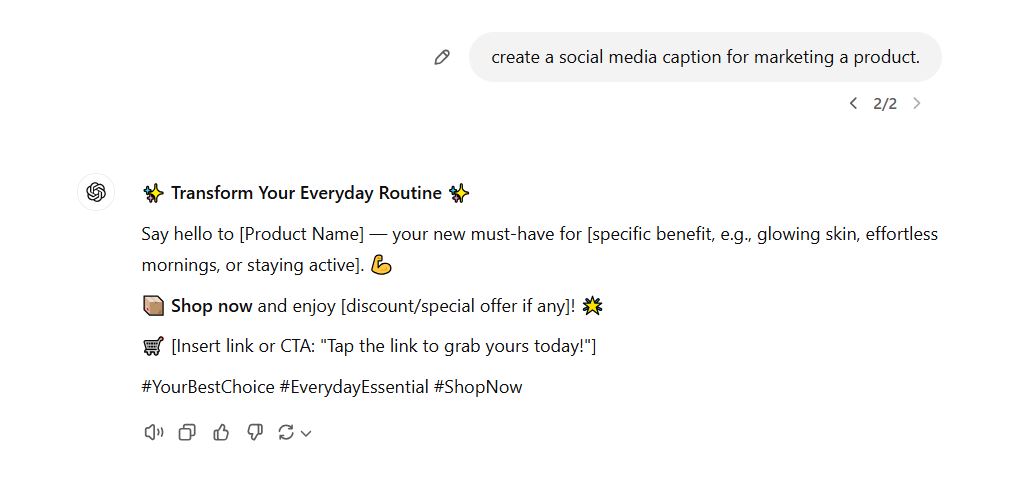
4. AI-Powered Personalization
AI-powered personalization involves using artificial intelligence to tailor marketing products, services, and content to individual clients. This is made possible by analyzing vast amounts of consumer data to find their patterns.
Such data is derived from multiple sources like browsing history, past purchases, interactions with ads, and social media movements. Machine learning algorithms are then employed to enable personalized suggestions and shape customer engagement.
Take Monetate for example. It’s a powerful tool that collects customer data from your site. It then helps customize the website content based on the browsing behaviors of each customer.
Here’s an example of Monetate providing accurate product recommendations based on what’s already in a customer’s shopping cart.
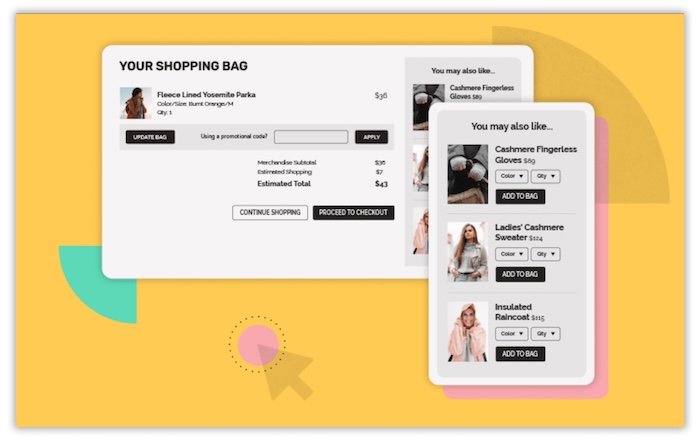
5. Customer Support Automation
The era of call centers is fast approaching its end as businesses are switching to chatbots for customer support. This approach has multiple benefits compared to the traditional use of human call agents.
Firstly, the chatbots are active 24/7 with instant automated responses. Secondly, there’s room for scalability since chatbots can handle simultaneous interactions, which can increase sales.
Finally, the same chatbots can be used to collect valuable data from daily customer interactions. Business owners can then use this data to further improve products and services.
VBOUT Chatbot is a great example of this transformation. It’s a multi-channel AI chatbot designed to streamline customer interactions across various platforms including website, SMS, Facebook, and Instagram Messenger. And you can even customize your bot information.
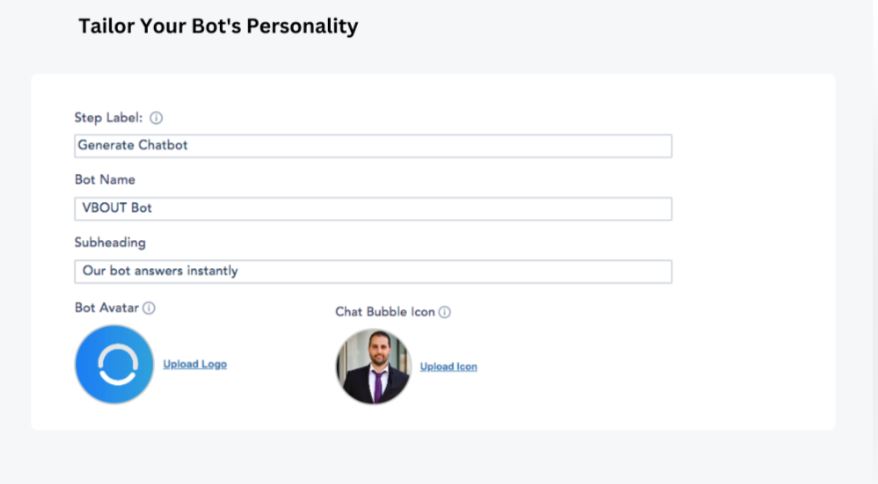
6. Website Design
Once upon a time, building a website required writing complicated lines of code. Today, business owners can use AI tools to create effective websites within hours.
A business website is crucial for marketing. AI website builders are game changers for businesses. You only need the basic knowledge of using builder templates.
Many AI website builders also come with built-in features like SEO, analytics, and insights tools. These builders are also highly customizable, giving you room to personalize any website to your business aesthetics.
Wix ADI is a good example of an AI-powered website builder. It handles the entire process from creating your site brief to publishing it, as shown below.

If you’re looking for good website builders, Attrock has curated a list of the best Wix alternative tools, which can help you make the right choice.
Ethical Concerns Associated With Using AI for Marketing
As you may have noticed, there’s a lot of consumer data needed for AI marketing to work. This raises a number of ethical concerns that include the following.
- Data Privacy and Security: There’s always a risk of mishandling sensitive user data with little to no safeguards to stop this. Compliance with CCPA or GDPR regulations must be enforced.
- Discriminatory Marketing Practices: Algorithms may unintentionally promote discriminatory marketing practices. This includes unfairly targeting or excluding consumers based on gender, socioeconomic status, or race.
- Invasion of Autonomy: Consumers are increasingly losing their power to choose. Overly tracking and predicting consumer actions is uncomfortable for targeted individuals.
Automation in Marketing Is Inevitable
This is how businesses are leveraging AI for marketing in the current digital sphere. Unresolved ethical concerns aside, AI is one of the few ways that businesses can compete successfully.
Whether it’s AI-driven marketing or automated customer support, ensure marketing automation tools you choose align well with your marketing goals. As usual, feel free to share your valuable insights on what worked best for you in the comments.
About the author
Gaurav Sharma is the founder and CEO of Attrock, a results-driven digital marketing company. Grew an agency from 5-figure to 7-figure revenue in just two years | 10X leads | 2.8X conversions | 300K organic monthly traffic. He also contributes to top publications like HuffPost, Adweek, Business 2 Community, TechCrunch, and more.
Don’t forget to share this article
Related articles
Nothing found.